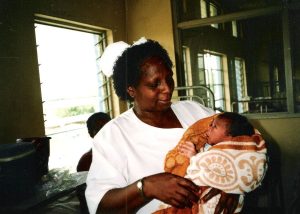Bringing Home the Babies
by Sr. M. Francis Morris (1919 – 1993) Ireland 04.01.2024
First published by MMM in 1952
 The early morning was cool, and the peace and stillness of the dawn was not yet broken by “the cares that infest the day” before we set out for Mbube, to do our weekly dispensary. Esa was in his usual driving form, which always reminds me of my mother’s friend who gave a warning before stepping on the accelerator. “Now, say three Hail Marys for a safe journey.” And we, knowing her form, added a few ‘trimmings’ on the quiet. After scaring the wits out of unwary strollers and chickens along the way, and with a magnificent flourish of the horn, Esa announced to the waiting crowd that we had arrived.
The early morning was cool, and the peace and stillness of the dawn was not yet broken by “the cares that infest the day” before we set out for Mbube, to do our weekly dispensary. Esa was in his usual driving form, which always reminds me of my mother’s friend who gave a warning before stepping on the accelerator. “Now, say three Hail Marys for a safe journey.” And we, knowing her form, added a few ‘trimmings’ on the quiet. After scaring the wits out of unwary strollers and chickens along the way, and with a magnificent flourish of the horn, Esa announced to the waiting crowd that we had arrived.
As usual, the people had turned out as if it to a football final. The little mud-walled room where we carried out treatment was a stadium, judging by their anxiety to get in before the man in front. Eventually, after about three hours of case histories, followed by prescriptions, injections, tablets, bandages and so forth, the ‘match’ was over, and we began to pack up.
t was then that Baby Number One came into my life. As if he knew he had to make a good impression, he lay there as quiet as a mouse in his father’s arms. “Please, Sister, his mother done die, make Sister be his mother now.” I looked at the little one, about three or four months old I judged, and, as yet not looking too undernourished. I weighed the pros and cons. By right they should go on another fifty miles to our orphanage – but would they? If not, I knew what the outcome would be. Unless specially cared for, a motherless baby out here will die within a few months at most. We would take it, I said, provided he had somebody to “look it”, as they say here, until we could send it on to the orphanage. To my surprise, the father had a small girl on the spot. He had made up his mind not to take any chance of a refusal! So here I was with my first African baby.
Feeling pleased with myself, I walked down to the car, followed by Baby Number One and all his relations. As I reached the car, I stopped dead. There, sitting on the grass was another man, yes, holding another baby. Suddenly, Doctor’s voice broke in: “Sister, could you ever take this baby? The mother is dead, and it will certainly die if we don’t take it.” “Of course,” I replied with some semblance of calm, I hope. I asked about the nursemaid – no one was available. I wondered how the rest of the community would react to my acquisitions. I certainly had to count on them.
And so Baby Number Two came into my life. He certainly looked as if he would not last a week. He was dehydrated, emaciated, and everything a neglected baby could be. On arrival I installed my ‘treasures’ in the quarters where all such “odds and ends” are kept – such as dispensary patients who decide to stay for a long weekend, being so pleased with their treatment. We broke the news gently to the household and all passed off much better than anticipated. Baby Number One was quite content as he had somebody’s hip to sit on and survey the world. Baby Number Two – well, a drop of brandy was indicated, and he slept all night. But next morning and all day long “the noise of battle roared” until at last “the poor pet” got used to our foreign ways and gradually he scored a record of ten non-crying hours.
The day arrived when the orphanage trip was planned. The staff were up early to see the babies scrubbed and dressed up in going away clothes, ready for 6am. Denis, Baby Number Two, as we now called him, refused to eat his breakfast. I wished I could talk to him and tell him of his father’s wishes. I would assure him he would find a good mother in his new home.
SEE ALL BLOG POSTS
